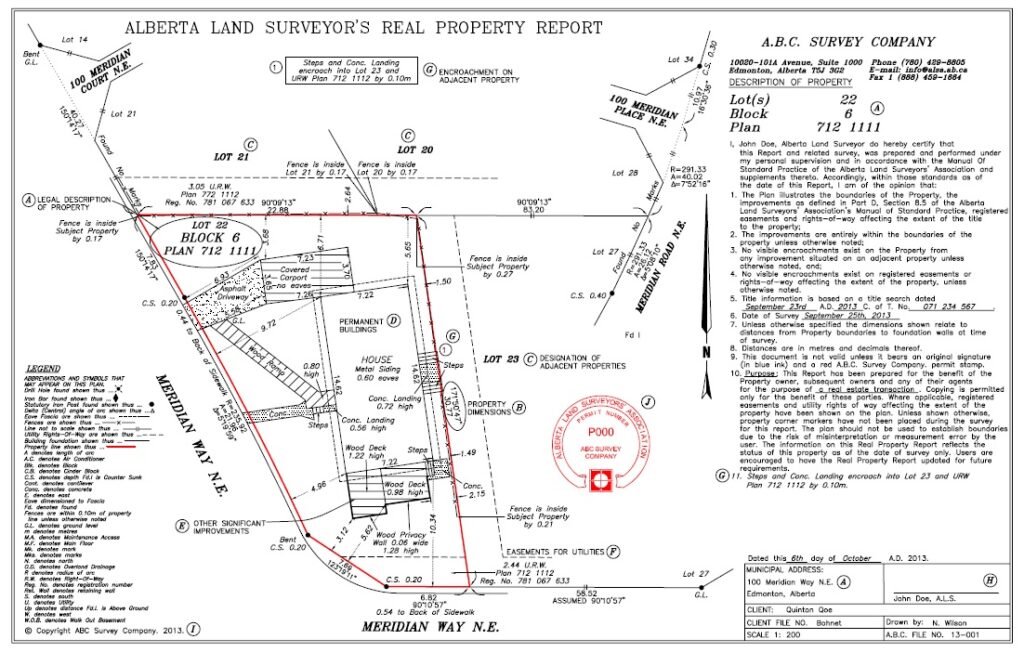Thinking about selling your home or buying a property in Alberta? One of the most important legal documents in any real estate transaction is the Real Property Report (RPR). Yet, many homeowners don’t realize that an outdated or missing RPR can lead to delays, extra costs, or even a failed sale.
So, what is an RPR, and why does it matter? Let’s break it down.
📌 What is a Real Property Report (RPR)?

A Real Property Report (RPR) is a legal survey document that shows:
- Property boundaries and lot size
- All structures on the property (house, garage, deck, fences, sheds, etc.)
- Any encroachments onto neighboring land or city property
- Compliance with municipal zoning bylaws
In Alberta, sellers are usually required to provide an up-to-date RPR with a municipal compliance stamp. This ensures that all structures on the property meet local regulations.
🚨 Why an Updated RPR is Essential
If your RPR is outdated or missing, it can lead to major legal and financial headaches. Here’s why:
✅ 1. It’s Required for Most Sales
Most real estate transactions in Alberta require the seller to provide an RPR to the buyer. Without one, buyers may be hesitant to move forward, or mortgage lenders may refuse financing.
✅ 2. It Confirms Legal Compliance
Municipal bylaws change, and new structures (like decks, garages, or fences) may not comply with current regulations. A new RPR ensures that your property meets zoning rules, preventing costly issues later.
✅ 3. Avoids Last-Minute Surprises
Many sellers only realize their RPR is outdated when they are about to close the sale. This can delay possession dates or require last-minute legal fixes.
✅ 4. Helps Buyers Feel Confident
Providing a current RPR reassures buyers that they’re making a sound investment. It gives them clarity on property lines, encroachments, and compliance.
⏳ When Should You Update Your RPR?
You need to update your RPR if:
- You’ve built a new structure (garage, deck, shed, fence, etc.)
- You’ve removed or modified an existing structure
- The last RPR is several years old, and municipal regulations have changed
- You don’t have an RPR at all
Even if you think nothing has changed, it’s a good idea to review your RPR with a real estate lawyer before listing your home.
📜 RPR vs. Title Insurance – What’s the Difference?
Some sellers think they can skip an RPR by offering title insurance, but these documents serve different purposes:
- RPR: Provides a physical survey of the property, showing all structures and compliance.
- Title Insurance: Protects against issues like fraud, past liens, and unknown title defects but doesn’t confirm property boundaries or compliance.
While title insurance is useful, it does not replace the need for an updated RPR.
💡 Still unsure if an RPR or Title Insurance is the better option? Stay tuned—our next article dives into the key differences between the two, and when each one is necessary.
🏡 What Should You Do If Your RPR is Outdated?
If your RPR is outdated or missing, here’s what you should do:
- Check if your existing RPR is still accurate.
- Contact a surveyor to update or create a new RPR.
- Submit the RPR to your municipality for a compliance review and stamp.
- Have a real estate lawyer review the document to ensure it meets all legal requirements.
Final Thoughts
A Real Property Report is more than just a document—it’s a critical part of any real estate transaction. Ensuring it is up to date can save you time, money, and stress when selling your home.
Real estate lawyer Asa Hagel explains why having a current RPR matters and how to avoid last-minute surprises.
Need your RPR reviewed? Connect with our team for expert legal and real estate advice.
📍 Got questions? @ARIVL.hq or visit www.arivl.ca for expert advice.
👉 Next up: The difference between an RPR and Title Insurance—when do you actually need both?
📞 Contact Asa Hagel for Legal Advice
Need expert guidance on your real estate transaction? Connect with real estate lawyer Asa Hagel at:
- 🏢 Law Firm: Barr LLP
- 📍 Location: 10123 99 St NW, Edmonton, AB T5J 3H1
- 📞 Phone: (780) 414-5400
- 📧 Email: ahagel@barrllp.com
- 🌐 Website: barrllp.com
For expert legal guidance on buying or selling real estate, reach out to Asa today.
